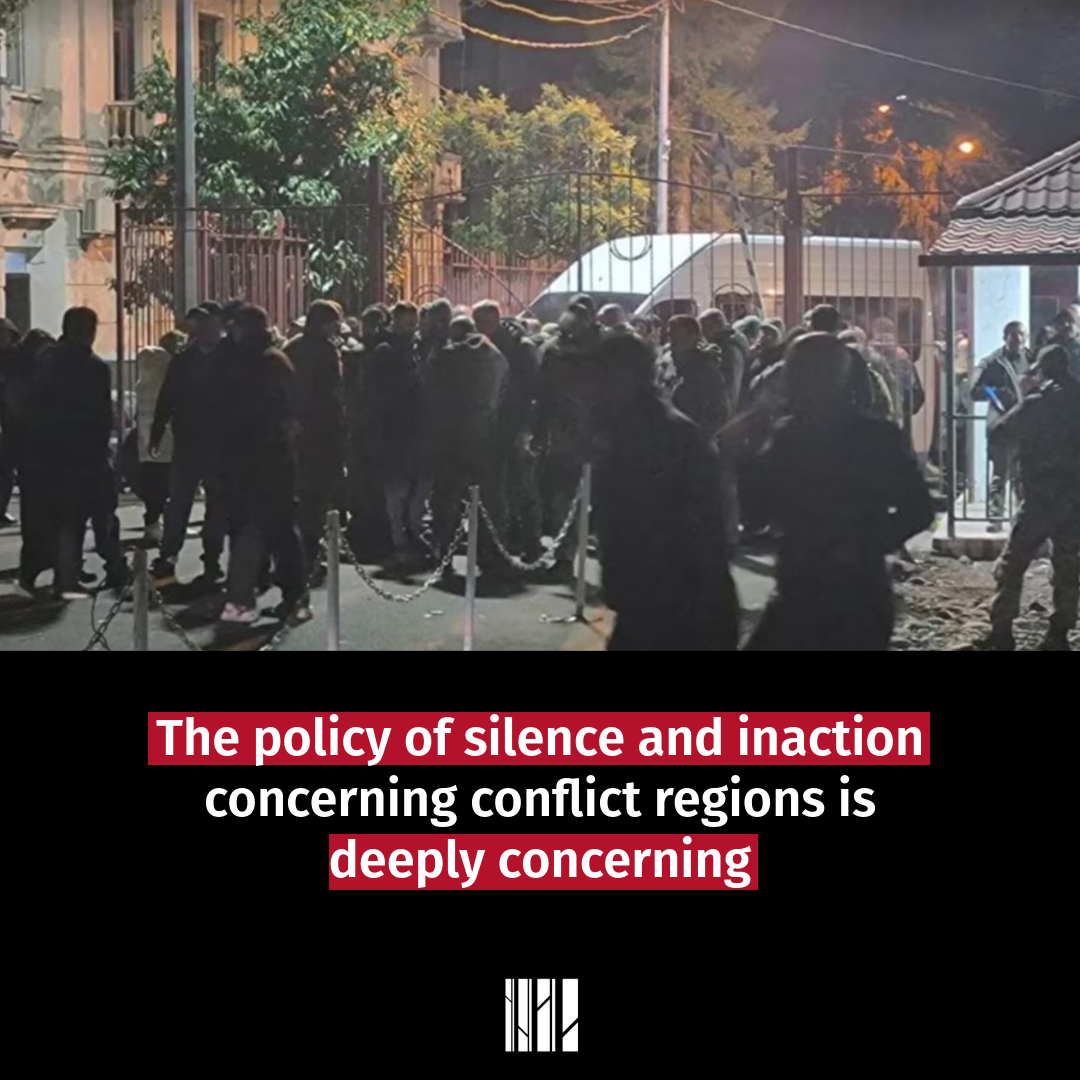საერთო ცხელი ხაზი +995 577 07 05 63


The Social Justice Center has responded to recent events in Abkhazia, pointing out that the Georgian government’s stance once again reveals its lack of a coherent peace policy toward conflict regions. Moreover, its policy of silence and inaction practically accommodates Russian annexation in the area, ultimately leading to the loss of significant historical opportunities for rebuilding trust and transforming conflicts.
As is known, a wave of public protests erupted in Abkhazia late on November 12, when the de facto authorities arbitrarily detained five local opposition members: Omar Smir, Gari Kokaya, Almaskhan Ardzinba, Ramaz Jopua, and Aslan Gvaramia, who had been taken to the so-called security service building on the evening of November 11. Locals reported that the detainment process was violent and degrading. These detentions followed the opposition’s protests against a new investment agreement that would place Abkhazia under Russian colonial economic control.
Reportedly, the so-called Parliament of Abkhazia is expected to ratify this agreement on November 15, which will allow Russian companies to implement investment projects in Abkhazia with special incentives. The agreement was reached between Abkhaz and Russian parties in July 2024, sparking dissatisfaction and protest within Abkhaz society. The terms of the agreement grant Russian businesses extensive concessions, exacerbating regional impoverishment and economic exploitation. The agreement includes provisions such as:
For months, Abkhaz society has voiced concerns that this agreement serves only Russian interests and brings no benefit to Abkhazia; instead, it could prove fatal for small local businesses.
In protest of the impending ratification, the Abkhaz opposition had planned a demonstration for November 15. However, on the evening of November 11, Abkhaz law enforcement detained the five opposition members using violent methods, leading to an immediate reaction from Abkhaz society. All night, protesters blocked the Gumista and Kodori bridges connecting to Sukhumi, with reports on Telegram channels that the de facto government had mobilized military equipment in the city. In response to the blockade and protest, the de facto security service released the detainees on the evening of November 12.
The recent events once again highlighted growing dissatisfaction and protest within Abkhaz society in response to Russia’s aggressive economic and political influence. For several years now, Abkhaz society has opposed the accelerated annexation efforts by Russia, which involve various initiatives, including the transfer of strategic assets and resources (such as Sukhumi’s Babushera Airport, Bichvinta state dachas, and the construction of apartments for Russian citizens).
In response to these developments, the Georgian government has opted for a policy of silence and inaction, refraining from making political statements, even on domestic or international levels, that would criticize and condemn Russia’s annexation process. It is clear that this approach contradicts Georgia’s sovereign interests and the government’s positive obligations to protect human rights in these territories.
The ruling “Georgian Dream” party’s policy of silence and inaction demonstrates that for years, the government has had no vision or strategy to respond to Russian annexation processes. The government can no longer maintain a balance between avoiding provocation toward Russia and protecting national interests; this passive approach only reinforces the discourse and perception of accommodating and normalizing Russia’s expansion and annexation in Abkhazia.
The intensifying Russian economic dominance in Abkhazia poses a security challenge for the entire Black Sea region, as the growth of Russian economic leverage in this area strengthens its strategic advantage. Internationally, Georgia’s government should be advocating for regional security and stability as broader objectives and strengthening diplomatic efforts to create a global agenda around these interests. Regrettably, this broad regional perspective and efforts to work internationally are wholly disregarded in government policy.
It is also evident that the “Georgian Dream” government has failed to develop a new type of peace policy that would offer Abkhaz society and elites new social and economic alternatives and security guarantees. Such a policy, particularly within the context of European integration, would elevate the trust-building process to a new level and create a fresh framework for dialogue and negotiation through EU mediation. However, this approach has become even more challenging since the European Union effectively halted Georgia’s accession process in response to the anti-democratic and anti-European policies of the “Georgian Dream” government. This situation highlights how the government’s anti-European foreign policy is damaging, especially in terms of peace policy and conflict resolution.
Current events and the government’s stance make it clear that the “Georgian Dream” party’s pre-election promises about new opportunities for conflict resolution were merely electoral manipulation, with no substantive efforts or strategies behind them. No positive dynamics are evident in the government’s official policies in this regard. Even after many years, the “Georgian Dream” administration has yet to update the strategic peace policy document inherited from the previous government.
It is essential for civil society, political parties, and the media to actively discuss the developments in Abkhazia. A broad social and political dialogue must commence to draft and agree on a new, democratic, and European peace policy that aligns with the evolving geopolitical context.
The website accessibility instruction